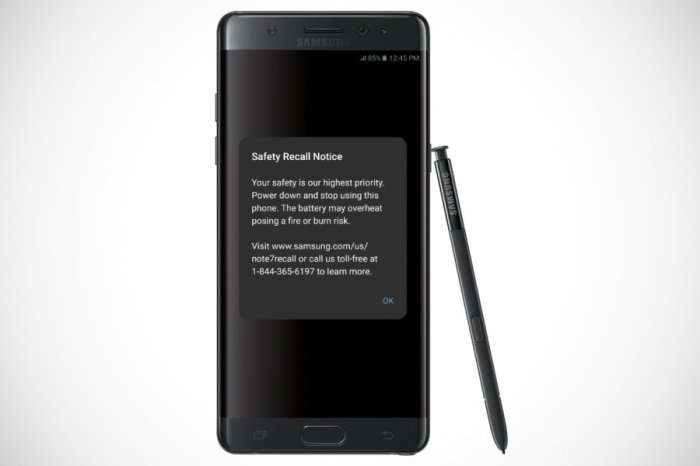Note 7 UK battery limited 30 percent: Remember that infamous Samsung debacle? The UK wasn’t immune to the Note 7’s fiery reputation, facing its own unique challenges with a significant battery limitation imposed on affected devices. This wasn’t just a minor inconvenience; it crippled functionality and sparked a firestorm (pun intended) of consumer frustration and legal wrangling. We delve into the specifics of this UK-centric saga, exploring the impact on consumers, Samsung’s response, and the broader implications for the tech industry.
From the initial recall announcements to the long-term effects on Samsung’s brand image, we unravel the story behind the 30% battery cap. We’ll examine the technical reasons for this limitation, compare the UK’s handling of the recall to other countries, and even explore the emotional rollercoaster experienced by users whose daily lives were disrupted. Get ready for a deep dive into a tech crisis that shook the UK.
Legal and Regulatory Implications: Note 7 Uk Battery Limited 30 Percent
The Samsung Galaxy Note 7 battery fiasco wasn’t just a PR nightmare; it triggered a complex web of legal and regulatory actions across the globe, including the UK. The sheer scale of the recall and the potential for serious harm necessitated swift and decisive intervention from both legal authorities and consumer protection agencies. This section explores the legal ramifications of the Note 7 battery issue in the UK and its wider impact on consumer rights.
Legal Actions and Investigations in the UK
While no single, massive class-action lawsuit dominated the headlines in the UK like some US cases, the Note 7 situation certainly prompted investigations. The UK’s Office of Fair Trading (OFT), later merged into the Competition and Markets Authority (CMA), likely received numerous complaints regarding the faulty batteries. These complaints would have focused on issues like the failure to adequately disclose the risk, potential breaches of consumer protection laws (such as the Consumer Protection Act 1987), and the inconvenience and financial losses suffered by consumers. The focus of investigations would have been on Samsung’s conduct and whether it met its obligations regarding product safety and consumer information. The lack of widespread, high-profile litigation in the UK likely reflects differences in legal frameworks and consumer behaviour compared to the US.
The Role of Regulatory Bodies in Overseeing the Recall, Note 7 uk battery limited 30 percent
The UK’s regulatory bodies, primarily the CMA (following the OFT merger) and potentially other relevant agencies, played a crucial role in overseeing the Note 7 recall process. Their involvement ensured Samsung followed proper procedures, communicated effectively with consumers, and offered adequate remedies. This included monitoring Samsung’s compliance with safety standards and ensuring the recall was conducted efficiently and fairly. The regulatory bodies’ actions likely focused on verifying the effectiveness of Samsung’s recall strategy and addressing consumer complaints. Non-compliance could have led to penalties and further investigations.
Impact on UK Consumer Protection Laws
The Note 7 incident highlighted existing vulnerabilities in consumer protection laws, particularly regarding the timely identification and response to widespread product defects. While existing legislation provided a framework for dealing with faulty products, the scale and urgency of the Note 7 recall may have prompted reviews and discussions on how to strengthen consumer protections further. The event served as a stark reminder of the need for robust regulations and effective enforcement mechanisms to safeguard consumers against similar incidents in the future. It likely influenced subsequent policy discussions and revisions within the consumer protection arena.
Similar Cases Involving Battery-Related Issues
The Note 7 wasn’t an isolated incident. Battery-related issues have plagued various electronic devices over the years, leading to recalls and legal battles. For instance, several laptop models from different manufacturers have faced recalls due to fire hazards related to faulty batteries. Similarly, issues with lithium-ion batteries in electric vehicles have also garnered significant attention, highlighting the ongoing challenges in ensuring the safety and reliability of these power sources. These examples demonstrate the consistent need for stringent quality control measures and proactive safety protocols throughout the design, manufacturing, and distribution of products containing lithium-ion batteries.
The Note 7 battery fiasco in the UK serves as a stark reminder of the potential consequences of battery failures in high-profile devices. The 30% battery limitation wasn’t just a technical issue; it was a public relations nightmare for Samsung, a frustrating experience for consumers, and a case study in crisis management. The fallout highlights the importance of rigorous battery testing, transparent communication, and swift action in the face of product defects. The lessons learned from this incident continue to shape the mobile phone industry’s approach to battery safety and consumer trust.
Remember the Note 7’s UK battery fiasco? That 30% capacity limit felt like a major bummer, right? It makes you wonder about the lengths companies will go to, especially considering the corporate espionage revealed in this article: lg exec indicted for sabotaging samsungs washing machine at ifa 2014. Apparently, underhanded tactics aren’t unheard of in the tech world, and the Note 7’s issues, while different, highlight a similar pressure-cooker environment.
Ultimately, the 30% battery limitation was a direct consequence of those pressures.
 Insurfin Berita Teknologi Terbaru
Insurfin Berita Teknologi Terbaru
